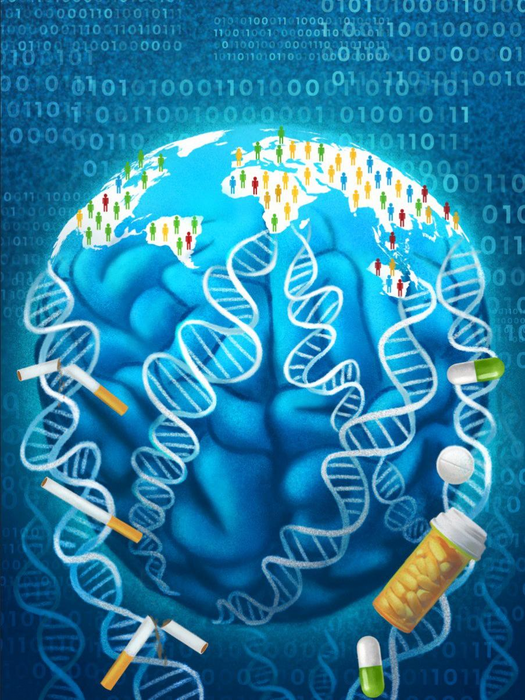HERSHEY, Pa. — Medications like dextromethorphan, used to treat coughs caused by cold and flu, could potentially be repurposed to help people quit smoking cigarettes, according to a study by Penn State College of Medicine and University of Minnesota researchers. They developed a novel machine learning method, where computer programs analyze data sets for patterns and trends, to identify the drugs and said that some of them are already being tested in clinical trials.

Credit: Ella Maru Studio for Penn State College of Medicine
HERSHEY, Pa. — Medications like dextromethorphan, used to treat coughs caused by cold and flu, could potentially be repurposed to help people quit smoking cigarettes, according to a study by Penn State College of Medicine and University of Minnesota researchers. They developed a novel machine learning method, where computer programs analyze data sets for patterns and trends, to identify the drugs and said that some of them are already being tested in clinical trials.
Cigarette smoking is risk factor for cardiovascular disease, cancer and respiratory diseases and accounts for nearly half a million deaths in the United States each year. While smoking behaviors can be learned and unlearned, genetics also plays a role in a person’s risk for engaging in those behaviors. The researchers found in a prior study that people with certain genes are more likely to become addicted to tobacco.
Using genetic data from more than 1.3 million people, Dajiang Liu, Ph.D., professor of public health sciences, and of biochemistry and molecular biology and Bibo Jiang, Ph.D., assistant professor of public health sciences, co-led a large multi-institution study that used machine learning to study these large data sets — which include specific data about a person’s genetics and their self-reported smoking behaviors.
The researchers identified more than 400 genes that were related to smoking behaviors. Since a person can have thousands of genes, they had to determine why some of those genes were connected to smoking behaviors. Genes that carry instructions for the production of nicotine receptors or are involved in signaling for the hormone dopamine, which make people feel relaxed and happy, had easy-to-understand connections. For the remaining genes, the research team had to determine the role each plays in biological pathways and using that information, figured out what medications are already approved for modifying those existing pathways.
Most of the genetic data in the study is from people with European ancestries, so the machine learning model had to be tailored to not only study that data, but also a smaller data set of around 150,000 people with Asian, African or American ancestries.
Liu and Jiang worked with more than 70 scientists on the project. They identified at least eight medications that could potentially be repurposed for smoking cessation, such as dextromethorphan, which is commonly used to treat coughs caused by cold and flu, and galantamine, which is used to treat Alzheimer’s disease. The study was published in Nature Genetics today, Jan. 26.
“Re-purposing drugs using big biomedical data and machine learning methods can save money, time and resources,” said Liu, a Penn State Cancer Institute and Penn State Huck Institutes of the Life Sciences researcher. “Some of the drugs we identified are already being tested in clinical trials for their ability to help smokers quit, but there are still other possible candidates that could be explored in future research.”
While the machine learning method was able to incorporate a small set of data from diverse ancestries, Jiang said it’s still important for researchers to build out genetic databases from individuals with diverse ancestries.
“This will only improve the accuracy with which machine learning models can identify individuals at risk for drug misuse and determine potential biological pathways that can be targeted for helpful treatments.”
Other College of Medicine authors on the project include Fang Chen, Xingyan Wang, Dylan Weissenkampen, Chachrit, Khunsriraksakul, Lina Yang, Renan Sauteraud, Olivia Marx and Karine Moussa. They declare no conflicts of interest. A full list of authors on the project can be found in the manuscript.
This research was supported by The National Institutes of Health (grants R01HG008983, R56HG011035, R01HG011035, R56HG012358, R01GM126479, R21AI160138 and R03OD032630) and Penn State College of Medicine’s Biomedical Informatics and Artificial Intelligence Program in the Strategic Plan. The views of the authors do not necessarily represent the views of the funders.
Journal
Nature Genetics
DOI
10.1038/s41588-022-01282-x




